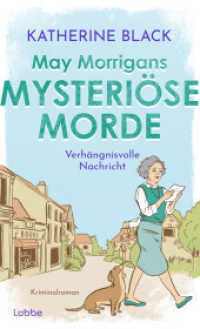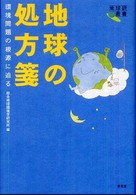- ホーム
- > 洋書
- > 英文書
- > Biography / Autobiography
Full Description
When author Gail Okawa was in high school in Honolulu, a neighbor mentioned that her maternal grandfather had been imprisoned in a World War II concentration camp on the US mainland. Questioning her parents, she learned only that "he came back a changed man." Years later, as an adult salvaging that grandfather's memorabilia, she found a mysterious photo of a group of Japanese men standing in front of an adobe building, compelling her eventually to embark on a project to learn what happened to him.
Remembering Our Grandfathers' Exile is a composite chronicling of the Hawai'i Japanese immigrant experience in mainland exile and internment during World War II—from pre-war climate to arrest to exile to return. Told through the eyes of a granddaughter and researcher born during that war, it is also a research narrative that reveals parallels between pre-WWII conditions and current twenty-first century anti-immigrant attitudes and heightened racism. The book introduces Okawa's grandfather, Reverend Tamasaku Watanabe, a Protestant minister, and other Issei prisoners—all legal immigrants excluded by law from citizenship—in a collective biographical narrative that depicts their suffering, challenges, and survival as highly literate men faced with captivity in the little-known prison camps run by the U.S. Justice and War Departments.
Okawa interweaves documents, personal and official, and internees' firsthand accounts, letters, and poetry to create a narrative that not only conveys their experience but, equally important, exemplifies their literacy as ironic and deliberate acts of resistance to oppressive conditions. Her research revealed that the Hawai'i Issei/immigrants who had sons in military service were eventually distinguished from the main group; the narrative relates visits of some of those sons to their imprisoned fathers in New Mexico and elsewhere, as well as the deaths of sons killed in action in Europe and the Pacific. Documents demonstrate the high degree of literacy and advocacy among the internees, as well as the inherent injustice of the government's policies. Okawa's project later expanded to include New Mexico residents having memories of the Santa Fe Internment Camp—witnesses who provide rare views of the wartime reality.








